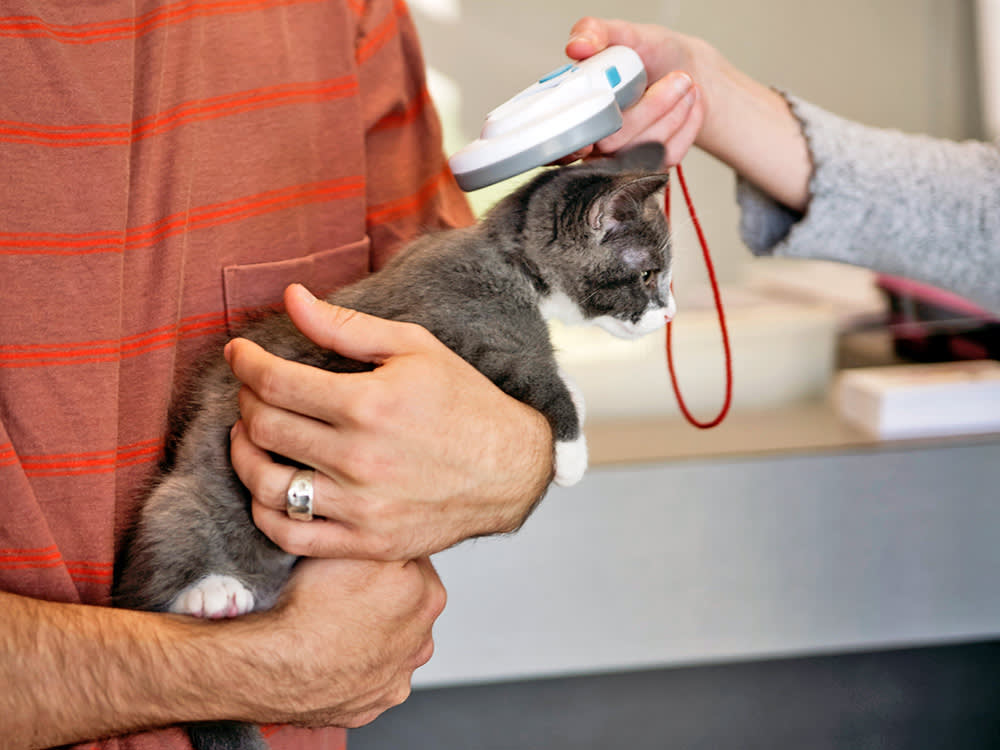Cat Microchipping Law: What Happens if You Don’t Comply
Microchipping your cat is quick and painless – and it’s now required by law

Share Article
Many pet parents get their four-legged friends microchipped as a matter of course – it’s just another thing for them to check off the list when they get a new cat or dog.
Not everyone remembers though. Perhaps you use a cat tracker and consider microchipping less useful, perhaps you acquired an older cat and never thought to check if a microchip was in place. Whatever the reason, research from the government in 2023 indicated that around 2.3 million of the nine million pet cats in England aren’t microchippedopens in new tab. And, to address this, Parliament passed a lawopens in new tab making microchipping pet cats compulsory, which came into effect on 10 June 2024.
Despite the risk of a fine of up to £500opens in new tab if your cat isn’t microchipped, a survey by DirectLine insuranceopens in new tab revealed that one in five people questioned were not intending on getting their cat microchipped, with reasons ranging from worrying the procedure would hurt their cat (19 percent) to the expense (17 percent). We’ve got the answers to all your burning questions so you can avoid that (rather spenny) fine and keep your kitty safe. Here’s everything you do need to know about the new law.
What is the new cat microchip law in 2025?
Cats in England must now be microchipped and registered on a database by the time they are 20 weeks old. The chip must be fitted by a trained professional, and the government advises asking your vet, local council or local rescue and rehoming centre if they can microchip your cat.
When you microchip your cat, they will need to be registered on one of a number of government-approved databases (there are quite a fewopens in new tab, but they talk to each other so theoretically, if you search one, you’re searching them all), so you’ll be asked for your address and contact details. You are responsible for keeping your details up to date – if you move house, for example. Likewise, if you rehome your cat, you should contact the database.
The government recommends asking for proof from the breeder or rescue centre that a microchip has been fitted before you get a cat. You might ask to see the microchip certificate, the cat’s vet records or their pet passport. You might be able to find microchip information in their insurance papers, too.
Some cats are exempt. Free-living cats with little or no human interaction or dependency, such as farm, feral or community cats, will not be legally required to get microchipped.
This law only covers England. In Scotland, Wales and Northern Ireland, microchipping cats will not become compulsory, but is still strongly recommended.
What is a cat microchip?
A microchip is a tiny device – around the size of a grain of rice – that gets inserted under your cat’s skin. It contains a unique code that links your cat to you through an online database. Vets and rescue centres can scan cats for microchips to help reunite them with their parents if they go missing.
In the vast majority of cases, microchips will last for your pet’s lifetime. However, in the extremely rare cases where a chip becomes faulty, the manufacturer will usually provide a replacement, which can be inserted alongside the original chip.
When did cat microchipping become law?
The law that requires cats to be microchipped in England came in to effect on 10 June 2024.
What happens if you don’t microchip your cat?
If your cat is found to not be microchipped, or is registered on a database that’s not on the government’s list, you’ll be given a 21-day period to get your cat microchipped. If you don’t you can be fined up to £500.
How will the cat microchipping law be enforced?
The cat microchipping law in England is enforced by local authorities, police officers and community support officers who can ask you to produce evidence that your cat is microchipped.
In which regions will the cat microchipping law be enforced?
At the moment, the law only applies to cats and their cat parents in England, but there have been calls for it to be made mandatory in Wales, Scotland and Northern Ireland, too.
How much does it cost to microchip a cat?
The cost of microchipping a cat can vary, but is usually between £10 and £30 – a lot cheaper than the potential fine! Some vets will include a microchip in their health plans, too, and can do it while your cat is being spayed or neutered.
Some charities offer microchipping for free, or at a discount. The RSPCA has even hosted a free microchipping weekend in the past, in a bid to encourage as many pet parents to get their cats and dogs microchipped.
If you adopt a cat, the charity or rescue centre may have already taken care of the microchipping for you, or your cat’s previous owners may have already microchipped them. But, while you won’t need to pay for a microchip, you will need to ensure that your cat’s details on the database are updated, and there may be a charge for this.
Does microchipping hurt cats?
The procedure itself is quick and simple, and no more painful than an injection. If your cat is getting their microchip while they’re being spayed or neutered, they’ll be under general anaesthetic anyway, and won’t feel a thing.
There’s no need for any recovery time afterwards, and your cat won’t feel any pain or discomfort. More than likely, they won’t be aware that it’s there.
When should you microchip your cat?
You should microchip your cat as soon as possible, ideally when they are a kitten around 8 weeks old, before they go outside for the first time, as this is the best way to ensure they can be identified if they get lost; many vets will microchip during their first vaccination appointment or when they are neutered. But remember, all cats must now be microchipped and registered on a database by the time they are 20 weeks old.
What are the benefits and limitations of microchipping your cat?
If your cat is lost or stolen, you should contact the database right away. They can make a note, and this means that your cat has a better chance of being reunited with you. Collars and tags can be removed, but a microchip is there for life.
However, a microchip won’t allow you to track your cat, and there are no guarantees that you’ll find your cat if they go missing, even with a chip.
It’s important to remember that a microchip is not legal proof of ownership by itself, too. According to the new legislation, the person who cares for and keeps the cat in their home is called a ‘keeper’ rather than an owner, and per the law a keeper is not necessarily the legal owner. However, the microchip must be registered to the keeper.
To prove ownership, you might need to provide evidence like insurance or veterinary records, or proof of purchase or adoption.
How to register your cat’s microchip
To register your cat’s microchip, you need to obtain the unique microchip number from your vet or adoption agency, then go online to the microchip company’s website and create an account to register your cat’s details with the chip number; this typically includes your contact information, your cat’s name and any relevant medical details.
Final thoughts: get your cat microchipped to avoid penalties
Microchipping your cat is actually in their best interests as well as yours. Although they won’t be the ones paying the £500 fine or breaking the law if you don’t do it, they’ll ultimately suffer most if they go missing and can’t be reunited with you again. The bottom line? Do it for them, and for you.
Cat microchipping law: frequently asked questions
How do I transfer ownership of a pet with a microchip in the UK?
To transfer ownership of a pet with a microchip in the UK, you can contact the microchip database company. They will provide you with a form or code to pass on to the new pet parent.
Do vets scan for microchips?
Yes, veterinarians routinely scan pets for microchips using a special scanner, allowing them to identify a lost animal and contact their pet parent if they have a microchip implanted.
Is it a legal requirement to microchip a cat?
Yes, since 10 June 2024 it is a legal requirement in England to microchip your cat.
How much is the fine for not microchipping your cat?
If your cat is found to not be microchipped, you’ll be given a 21-day period to get your cat microchipped. If you don’t you can be fined up to £500.

Adam England
Adam England is a lifestyle and culture journalist who has written for publications including PetsRadar, Verywell Mind, People and Healthline. When he’s not writing, he might be visiting his parents’ Golden Retriever, looking up cats for adoption, or getting into arguments over music.
Related articles
![Two vets sit on the pavement in the background with an old Staffie dog in the foreground.]()
How StreetVet Supports People and Their Pets Experiencing Homelessness
Meet the charity that helps protect the animal-human bond
![A woman staring at her computer while holding her dog close.]()
10 Things to Consider Before Adopting a Pet
It’s a big decision, so tick these boxes before you sign on the dotted line
![woman hugging dog]()
Where to Get Help If You’re Struggling to Afford Your Pet
If you’re struggling with pet care costs, you are far from alone and there’s no shame seeking help. Here’s a few places to start
![A woman with dark curly hair lifting a box with a plant in a pot balanced on top to another area in the home]()
How to Prepare For an Adoption Home Visit
7 tips for acing your inspection and bringing your new pup home
![cat in red bow tie being held up by hand]()
8 Things You Needn’t Splurge On For Your Pet (If You Don’t Want To)
If you don’t buy these things for your beloved cat or dog, you’re not a bad pet parent







